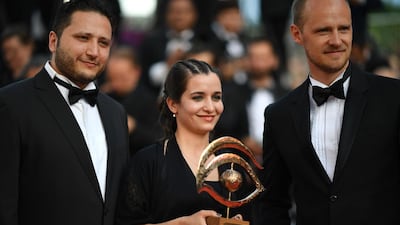"For Sama", a documentary shot from inside besieged Aleppo, has been awarded the Prix L’Œil d’Or for Best Documentary at the 2019 Cannes Film Festival, which came to a close on Saturday.
The documentary narrates the intimate and epic journey of one woman, 26-year-old Syrian filmmaker Waad al-Kateab, through five years of life in the rebel-held city as she falls in love, gets married and gives birth to her first daughter, Sama.
The film is the first feature documentary by Emmy award-winning filmmakers, Waad al-Kateab and Edward Watts.
It was featured at Cannes Film Festival as a Special Screening and received a standing ovation and critical accolades.
The jury gave a special mention to Palestinian filmmaker Elia Suleiman's "It Must Be Heaven", focusing on the shifting experiences of an exile who goes on a meandering odyssey from his hometown of Nazareth to the streets of Paris and New York.
The Cannes Palme d'Or top prize was won by "Parasite", a black comedy about a family of clever scammers from South Korea's underclass.
Director Bong Joon-ho, 49, became the first Korean in the festival's 72-year history to scoop the coveted award, which critics said powerfully tapped into the tensions caused by the widening gap between rich and poor around the world.
"I was a little boy who was crazy about cinema since I was 12 years old," Mr Bong said, hoisting the palm-frond statuette in the air.
The first black women director ever to compete for the top prize at Cannes in its 72-year history took its second prize Grand Prix Saturday for her haunting ghost story about African migrants.
Mati Diop, 36, grew up in France and belongs to a Senegalese artistic dynasty that includes her uncle, acclaimed director Djibril Diop Mambety, and her father, musician Wasis Diop.
It was while she was making a short film in Senegal a decade ago that she began to wrestle with the tragic push-and-pull factors leading Africans to flee the continent.
"I was spending time in Dakar at the time and was struck by the complex and sensitive realities of the phenomenon we called at the time 'illegal emigration'," she said.
"Once I had finished my (short) film, I felt I still had a lot of dimensions and issues to explore. I had the desire and the idea to tell the story of youth disappearing into the sea, through the perspective of a young woman."
She chose a Romeo and Juliet story of star-crossed young lovers, but with a supernatural twist.
The third-place jury prize was shared by the gritty French police drama "Les Miserables" and Brazil's "Nighthawk," a darkly satirical Western seen as a searing indictment of life under the country's far-right President Jair Bolsonaro.
Quentin Tarantino failed to win the jury's favour with "Once Upon a Time... in Hollywood", which brought together two of Tinseltown's most dashing leading men, Brad Pitt and Leonardo DiCaprio, for the first time.
Spanish star Antonio Banderas captured the best actor prize for Pedro Almodovar's hit "Pain and Glory", a loosely autobiographical picture based on the director's colourful life.
"I respect him, I admire him, I love him, he's my mentor and he's given me so much in my entire life that this award, obviously, has to be dedicated to him," Mr Banderas said of Mr Almodovar, who cast the actor in eight films and helped make him a global box office draw.
Belgium's Dardenne brothers, already two-time winners of the Palme d'Or, clinched the best director gong for "Young Ahmed" about a teenage boy who falls under the influence of an Islamist hate preacher.
"Thank you to the jury for recognising this film, which we saw as an ode to life," Luc Dardenne said of the film's ultimately hopeful message.
His elder brother Jean-Pierre said the movie offered an optimistic vision "in these dark and difficult times with identitarian populism on the rise."
* With Agencies

